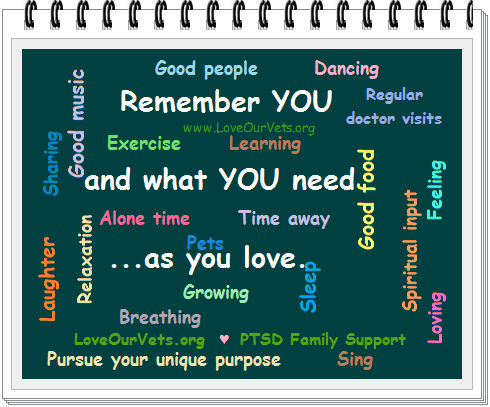Recently I was catching up with another wife, whose husband also struggles with PTSD. After hearing her talk about the kids, her job, PTSD, and her husband, I asked point blank: “How are you doing?” Long pause. “How are YOU doing?” I asked again. She seemed a bit confused. Stunned. Here she was on a roll going on about everything else in her life, but was stopped short when asked about herself.
How are we doing? That is a question we as loved ones NEED to ask ourselves. Regularly. If we neglect our own needs in our noble efforts of caring for those we love, we are in serious danger of burnout. Physically and emotionally.
A few weeks ago I was privileged to be the speaker at a conference. The physical and emotional demands of the weekend above and beyond the usual stresses of daily life almost put me over the top. (My husband may testify that I was over the top.) 😉 Thankfully, I did all I could to take care of my physical needs (my favorite comfy pillows, good food, time alone when I could, etc.). God gave me strength, and then I spent the entire next two weeks recuperating.
In talking with my counselor afterwards, I learned something fascinating: trauma freezes the body. Whether our secondary trauma from living with the PTSD in our homes, or even more so with firsthand trauma such as our vets and some of us ourselves have experienced, the body cannot move. At the moment of trauma, the body is frozen. Helpless. Out of control. Not safe! The physical body, brain, emotions thoughts, feelings…every part of us is affected by the trauma. And the body never forgets.
However, the good news is that one of the things that can help release the ingrained trauma is helping our bodies feel safe. This is valuable not only for those with PTSD but an important concept for everyone. In our quest for healing and growth, we often spend much effort on our thoughts, wills and emotions in our attempts to find relief from the tyrannical symptoms of PTSD. And all of these efforts are essential. But equally important is to address our physical needs. What can I do to make my body safe?
Many of our vets try to do this by elaborate home security systems, guns, and hyper-vigilance. Maybe those efforts pay off. What about us?
What do YOU need to feel physically safe?
It may be an urgent severe need, such as getting out of an unsafe relationship or environment. Or all too often it is the subtle needs that go unnoticed. Could you use a good massage? Perhaps you can change your wall color to one that is more comforting. Or soak up that favorite CD that nurtures your soul. Do you need more sleep? Or more time alone? Maybe you need a canine companion. Or need to let loving arms embrace you. Maybe some shoes that really feel good. Or eating more kale (seriously, it can be good! Okay, or maybe chocolate for non-kale lovers.)
In LOVE OUR VETS: Restoring Hope for Families of Veterans with PTSD, the entire middle section of the book is devoted to taking care of ourselves. There is a fun and helpful self-evaluation checklist to help each of us better see how we are doing.
Taking care of our needs and doing what we can to keep our bodies safe is essential not only to us, but also for our loved ones. The more we can learn to ask ourselves how we are doing, and encourage our loved ones to do the same, the healthier and more fulfilled we will be. Not perfect. Not trouble-free. But alive. And growing. In spite of post-traumatic stress, or any other challenges of everyday life, we do have hope.
How are you doing?
.






